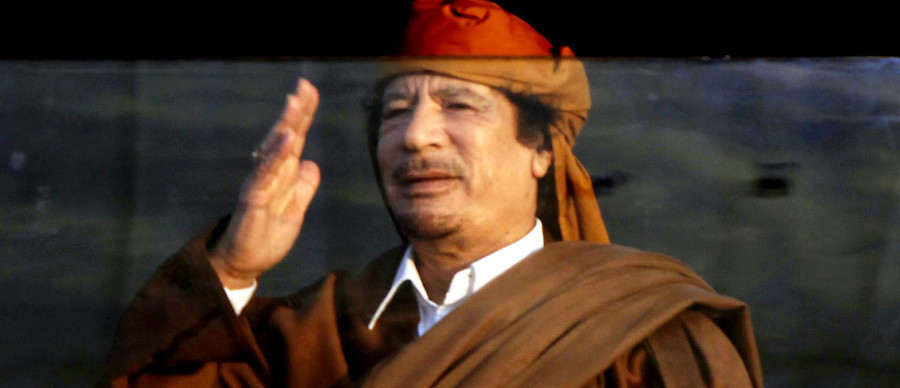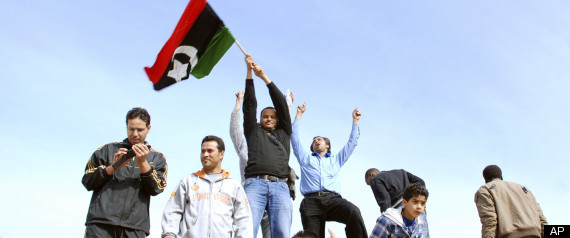
CAIRO — Deep cracks open up in Moammar Gadhafi’s regime after more than 40 years in power, with diplomats abroad and the justice minister at home resigning, air force pilots defecting and a fire raging at the main government hall after clashes in the capital Tripoli. Protesters called for another night of defiance in Tripoli’s main square despite the government’s heavy crackdown.
Gadhafi’s regime appeared to be preparing a new major assault in the capital Monday night in an attempt to crush unrest that has already swept the eastern parts of the country – leaving Libya’s second largest city in protesters’ control – and was now overwhelming the capital of 2 million people.
State TV at nightfall Monday announced that the military had “stormed the hideouts of saboteurs” and called on the public to back the security forces as protesters called for a new demonstration in central Green Square and in front of Gadhafi’s Tripoli residence.
Military warplanes were seen swooping low over the city in the evening, and snipers had taken position on the roofs of buildings around Tripoli, apparently to stop people from outside the capital from joining the march, according to Mohammed Abdul-Malek, a London-based opposition activist in touch with residents.
Communications into the capital appeared to have been cut, and mobile phones of residents could not be reached from outside the country. State TV showed images of hundreds of Gadhafi supporters rallying in central Green Square Monday evening, waving pictures of the Libyan leader and palm fronds.
The eruption of turmoil in the capital after six days of protests and bloody clashes in Libya’s eastern cities sharply escalates the challenge to Gadhafi, the Arab world’s longest ruling leader. His security forces have unleashed the bloodiest crackdown of any Arab country against the wave of protests sweeping the region, which toppled the leaders of Egypt and Tunisia. At least 233 people have been killed so far, according to New York-based Human Rights Watch.
The chaos in Libya, an OPEC country that is a significant oil supplier to Europe, was raising international alarm. Oil prices jumped $1.67 to nearly $88 a barrel Monday amid investor concern. European nations were eying an evacuation of their citizens.
British Prime Minister David Cameron, visiting neighboring Egypt, called the Libyan government’s crackdown “appalling.”
“The regime is using the most vicious forms of repression against people who want to see that country – which is one of the most closed and one of the most autocratic – make progress,” he told reporters in Cairo.
The heaviest fighting so far has been in the east. In Libya’s second largest city, Benghazi, security forces opened fire on Sunday on protesters storming police stations and government buildings. But in several instances, units of the military turned against them and sided with protesters.

By Monday, protesters had claimed control of the city, overrunning its main security headquarters, called the Katiba.
Celebrating protesters raised the flag of the country’s old monarchy, toppled in 1969 by a Gadhafi-led military coup, over Benghazi’s main courthouse and on tanks around the city.
“Gadhafi needs one more push and he is gone,” said Amal Roqaqie, a lawyer at the Benghazi court, saying protesters are “imposing a new reality … Tripoli will be our capital. We are imposing a new order and new state, a civil constitutional and with transitional government.”
Gadhafi’s son, Seif al-Islam, went on state TV in the early hours Monday with a sometimes confused speech of nearly 40 minutes, vowing to fight and warning that if protests continue, a civil war will erupt in which Libya’s oil wealth “will be burned.”
“Moammar Gadhafi, our leader, is leading the battle in Tripoli, and we are with him,” he said. “The armed forces are with him. Tens of thousands are heading here to be with him. We will fight until the last man, the last woman, the last bullet.” he said.
He also promised “historic” reforms in Libya if protests stop, and on Monday state TV said he had formed a commission to investigate deaths during the unrest. Protesters ignored the vague gestures. Even as he spoke, the first clashes between protesters and security forces in the heart of Tripoli were still raging, lasting until dawn.
During the day Monday, a fire raged at the People’s Hall, the main hall for government gatherings where the country’s equivalent of a parliament holds its sessions several times a year, the pro-government news web site Qureyna said.
It also reported the first major sign of discontent in Gadhafi’s government, saying justice minister Mustafa Abdel-Jalil resigned from his post to protest the “excessive use of force against unarmed protesters.”
Libya’s U.N. ambassadors called for Gadhafi to step down, and there were reports of a string of ambassadors abroad defecting. Libya’s former ambassador to the Arab League in Cairo, Abdel-Moneim al-Houni, who a day earlier resigned from his post to side with protesters, issued a statement demanding Gadhafi and his commanders and aides be put on trial for “the mass killings in Libya.”
“Gadhafi’s regime is now in the trash of history because he betrayed his nation and his people,” al-Houni said.
A Libyan diplomat in China, Hussein el-Sadek el-Mesrati, told Al-Jazeera, “I resigned from representing the government of Mussolini and Hitler.”
Two Mirage warplanes from the Libyan airforce fled a Tripoli air base and landed on the nearby island of Malta, and their pilots – two colonels – asked for political asylum, Maltese military officials said.
MAGGIE MICHAEL [SOURCE:AP/The Huffington Post]










































